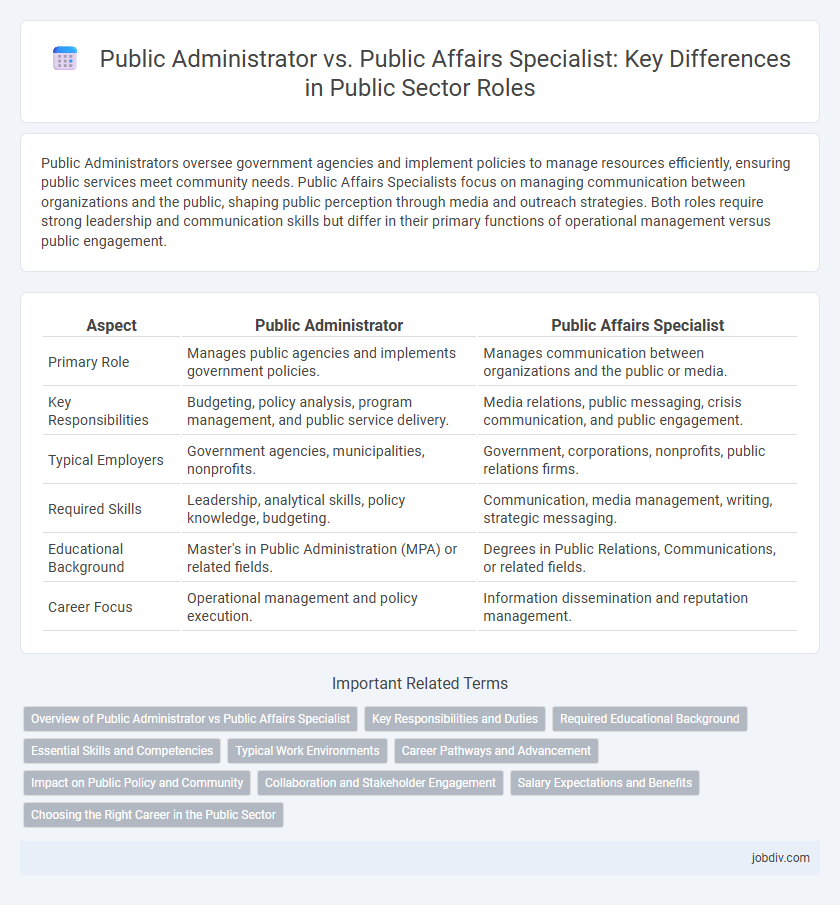Public Administrators oversee government agencies and implement policies to manage resources efficiently, ensuring public services meet community needs. Public Affairs Specialists focus on managing communication between organizations and the public, shaping public perception through media and outreach strategies. Both roles require strong leadership and communication skills but differ in their primary functions of operational management versus public engagement.
Table of Comparison
| Aspect | Public Administrator | Public Affairs Specialist |
|---|---|---|
| Primary Role | Manages public agencies and implements government policies. | Manages communication between organizations and the public or media. |
| Key Responsibilities | Budgeting, policy analysis, program management, and public service delivery. | Media relations, public messaging, crisis communication, and public engagement. |
| Typical Employers | Government agencies, municipalities, nonprofits. | Government, corporations, nonprofits, public relations firms. |
| Required Skills | Leadership, analytical skills, policy knowledge, budgeting. | Communication, media management, writing, strategic messaging. |
| Educational Background | Master's in Public Administration (MPA) or related fields. | Degrees in Public Relations, Communications, or related fields. |
| Career Focus | Operational management and policy execution. | Information dissemination and reputation management. |
Overview of Public Administrator vs Public Affairs Specialist
Public Administrators manage government programs and policies, focusing on implementing and overseeing public services to ensure efficiency and compliance with regulations. Public Affairs Specialists concentrate on communication, shaping public perception, and managing relationships between the government or organizations and the public through media, public relations, and community engagement. Both roles are essential in public sector operations but differ in their core functions: administration versus communication and outreach.
Key Responsibilities and Duties
Public Administrators manage government operations, including budgeting, policy implementation, and personnel oversight to ensure efficient public service delivery. Public Affairs Specialists handle communication strategies, media relations, and community engagement to promote organizational goals and foster public trust. Both roles require strong leadership and strategic planning to address public needs effectively.
Required Educational Background
A Public Administrator typically requires a bachelor's or master's degree in public administration, public policy, or a related field emphasizing management and organizational skills. Public Affairs Specialists often hold degrees in communications, public relations, political science, or journalism, focusing on media relations, strategic communication, and stakeholder engagement. Both professions benefit from advanced degrees and practical experience, but academic emphasis distinguishes the Public Administrator's management-oriented training from the Public Affairs Specialist's communication-centered education.
Essential Skills and Competencies
Public Administrators excel in organizational management, policy analysis, and budgeting, ensuring efficient implementation of government programs. Public Affairs Specialists specialize in communication strategies, media relations, and stakeholder engagement to shape public perception and foster community support. Both roles require strong leadership, critical thinking, and problem-solving skills to navigate complex public sector environments effectively.
Typical Work Environments
Public Administrators typically work in government agencies, municipal offices, and non-profit organizations where they oversee policy implementation and manage public programs. Public Affairs Specialists are commonly employed in corporate communications departments, government public relations offices, and advocacy groups, focusing on media relations and stakeholder engagement. Both roles often require collaboration with community leaders, but Public Administrators are more involved in internal policy processes while Public Affairs Specialists prioritize external communication strategies.
Career Pathways and Advancement
Public Administrators typically advance through roles in government agencies or nonprofit organizations, focusing on policy implementation, budgeting, and organizational management. Public Affairs Specialists often progress within communications, media relations, and public outreach sectors, emphasizing stakeholder engagement and messaging strategies. Career pathways for Public Administrators lead to senior management and executive positions, while Public Affairs Specialists may advance toward director-level roles in corporate communications or government relations.
Impact on Public Policy and Community
Public Administrators directly influence public policy through the implementation and management of government programs, ensuring policies effectively address community needs and improve public services. Public Affairs Specialists shape public opinion and advocate for policy changes by engaging with media, stakeholders, and the community, thereby enhancing community awareness and participation. Both roles are critical in bridging government initiatives with public interests, fostering transparency and responsive governance.
Collaboration and Stakeholder Engagement
Public administrators coordinate resources and policies to effectively manage government programs, emphasizing collaboration with internal departments and community organizations to achieve public goals. Public affairs specialists focus on strategic communication and stakeholder engagement, crafting messages that foster positive relationships between agencies and the public while managing media relations. Both roles rely on collaborative efforts and stakeholder interaction to enhance transparency, build trust, and ensure successful implementation of public initiatives.
Salary Expectations and Benefits
Public Administrators typically earn an average salary ranging from $60,000 to $90,000 annually, with benefits including health insurance, retirement plans, and paid leave reflecting government sector standards. Public Affairs Specialists command salaries between $55,000 and $85,000, often supplemented by performance bonuses, media training opportunities, and extensive networking resources. Both roles offer job stability and professional development, but Public Administrators generally receive higher retirement benefits due to their broader managerial responsibilities.
Choosing the Right Career in the Public Sector
Public Administrators oversee government operations, focusing on policy implementation, budgeting, and organizational management, making them ideal for individuals interested in leadership and administration within public agencies. Public Affairs Specialists concentrate on communication strategies, media relations, and public engagement to shape public perception and ensure transparency, suited for those with strengths in messaging and stakeholder interaction. Selecting the right career requires evaluating skills in management versus communication, alongside passion for policymaking or public outreach in the public sector.
Public Administrator vs Public Affairs Specialist Infographic

 jobdiv.com
jobdiv.com